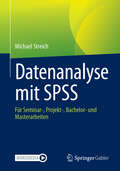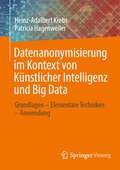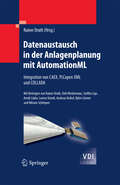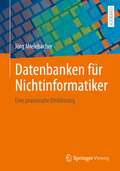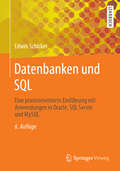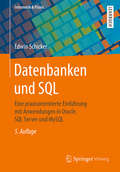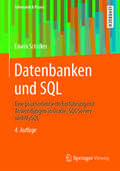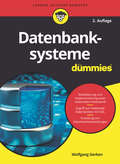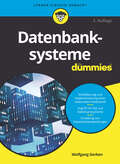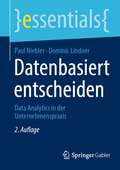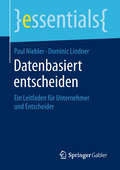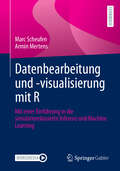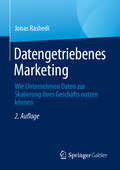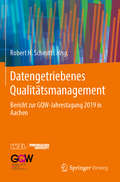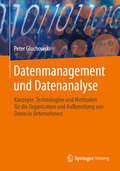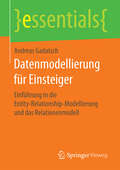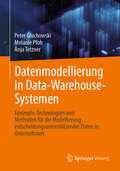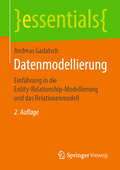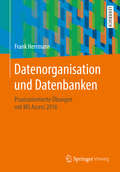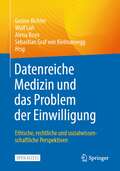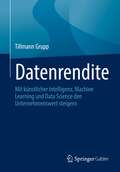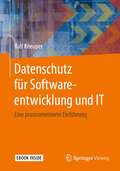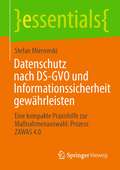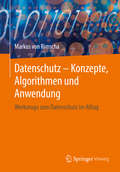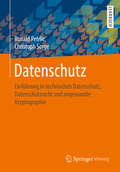- Table View
- List View
Datenanalyse mit SPSS: Für Seminar-, Projekt-, Bachelor- und Masterarbeiten
by Michael StreichDieses Buch richtet sich an Studentinnen und Studenten, die im Rahmen ihrer Seminar-, Projekt-, Bachelor- oder Masterarbeit quantitative Daten erheben. Neben deskriptiven Analysen sind in solchen Situationen zumeist induktive statistische Verfahren gefordert, die auf den ersten Blick teilweise relativ komplex erscheinen. In diesem Buch werden typische Verfahren eingeordnet und inhaltlich erläutert. Neben einer einfachen Einführung werden im Nachgang vertiefende Analysen vorgestellt. Alle Verfahren werden anhand von Beispielen auf Basis der Statistiksoftware IBM SPSS® dargestellt, die einen sehr einfachen Zugang auch zu komplexeren Verfahren bietet. Dabei werden die Beispiele, nach einer Einführung in das Programm als solches, systematisch Schritt für Schritt bearbeitet, so dass auch eigene Analyse im Rahmen schriftlicher Arbeiten problemlos vorgenommen werden können.
Datenanonymisierung im Kontext von Künstlicher Intelligenz und Big Data: Grundlagen – Elementare Techniken – Anwendung
by Heinz-Adalbert Krebs Patricia HagenweilerDie fortschreitende Digitalisierung, die immer höhere Verfügbarkeit des Internets in Echtzeit sowie die progressive Entwicklung der IT ermöglichen es Unternehmen und Organisationen, Daten in einem nie zuvor dagewesenen Umfang zu erzeugen und zu verarbeiten, wodurch sie einen enormen Stellen- und Marktwert erhalten haben. Zudem kann mithilfe der künstlichen Intelligenz (KI) das in den Daten enthaltene Wissen extrahiert werden. Oft handelt es sich dabei um gesammelte Daten von Personen, mit denen Vorhersagen über verschiedene Aspekte der Personen getroffen werden können.Das Buch befasst sich mit der Anonymisierung im Kontext der KI und Big Data. Dazu werden die wesentlichen Grundlagen dargestellt sowie pseudonymisierte und anonymisierte Daten mit Personenbezug im Rahmen der Datenschutz-Grundverordnung (DSGVO) und des Bundesdatenschutzgesetzes (BDSG) beleuchtet. Es werden Möglichkeiten zur Pseudonymisierung, zu den jeweiligen Techniken und Verfahren der Anonymisierung sowie entsprechende Risikobetrachtungen behandelt. Abschließend wird die Vorgehensweise der Anonymisierung aus rechtlicher und technischer Sicht unter Anwendung entsprechender Software behandelt.
Datenaustausch in der Anlagenplanung mit AutomationML: Integration von CAEX, PLCopen XML und COLLADA (VDI-Buch)
by Rainer DrathDas Buch gibt erstmals einen umfassenden Überblick über die Technologie AutomationML und die Integration von CAEX, COLLADA und PLCopen XML. Mit AutomationML soll die Interoperabilität zwischen digitalen Werkzeugen im Engineering-Prozess gefördert werden. Es ist das erste kostenfrei zugängliche, offene und XML-basierte Format, das übergreifend eine Vielzahl von Planungsaspekten kombiniert. Das Buch ist ein Gemeinschaftswerk des AutomationML-Konsortiums. Es wurde so konzipiert, dass es als Kompendium und zugleich als Entscheidungshilfe dienen kann.
Datenbanken für Nichtinformatiker: Eine praxisnahe Einführung
by Jörg MielebacherDaten sind zu einem wichtigen Rohstoff in vielen Bereichen geworden. Auch Nichtinformatiker müssen große Datenbestände pflegen und nach den für sie relevanten Informationen durchsuchen. Dieses praxisnahe Lehrbuch zeigt, wie man hierfür Datenbanken einsetzt, wie man deren Inhalte mit der Abfragesprache SQL auswertet und worauf man bei Entwurf und Betrieb von Datenbanken achten muss.Zahlreiche Abbildungen und Anwendungsbeispiele vermitteln einen gut verständlichen Einblick in dieses wichtige Thema. Aber auch Berufspraktiker mit Interesse an Datenbanken finden wichtige Hinweise und Lösungsansätze für ihre Arbeit.
Datenbanken und SQL: Eine praxisorientierte Einführung mit Anwendungen in Oracle, SQL Server und MySQL
by Edwin SchickerDieses Buch vermittelt fundierte Grundkenntnisse sowohl in Datenbanken als auch in SQL. Eine Zusammenfassung und zahlreiche Übungsaufgaben in jedem Kapitel dienen der Vertiefung des Stoffes und verbessern den Lernerfolg deutlich. Die Schwerpunkte des Buches sind relationale Datenbanken, Entwurf von Datenbanken, die Programmiersprache SQL und der Zugriff auf Datenbanken mittels der Sprache PHP. Aber auch Themen wie Recovery, Concurrency, Sicherheit und Integrität werden ausführlich besprochen. Ein Kapitel zu verteilten Datenbanken, NoSQL und objektrelationalen Datenbanken führt in die jeweilige Thematik ein. Ein eigenes Kapitel über Performance gibt wertvolle Anregungen und Tipps zum Betrieb von leistungsfähigen Datenbanken. Der Autor legt sehr viel Wert auf die praktische Anwendung. Mit Hilfe einer Beispieldatenbank kann das Gelernte sofort geübt werden. Diese Datenbank, alle vorgestellten Programme und die Lösungen zu allen Übungen werden im Internet zum Download bereitgestellt.
Datenbanken und SQL: Eine praxisorientierte Einführung mit Anwendungen in Oracle, SQL Server und MySQL (Informatik & Praxis #17)
by Edwin SchickerDatenbanken entstanden ab etwa 1960 aus der Notwendigkeit, die logischen auf die immer gr#65533;#65533;er werdenden Datenmengen zu vereinfachen und Zugriffe zu normieren. Wurden diese Datenbanken #65533;ber mehr als zwei Jahrzehnte hin#65533; weg ausschlie#65533;lich auf Gro#65533;rechnern eingesetzt, so haben sie inzwischen ihren Siegeszug auch auf Kleinrechnern angetreten. Erm#65533;glicht wurde dies aus dreierlei Gr#65533;nden: erstens durch die enorm gestiegene Rechnerleistung der letzten Jahre, zweitens durch die Verwendung relationaler Datenbanken und drittens durch die Einf#65533;hrung grafischer Oberfl#65533;chen. Die Anfang der 70er Jahre entwickelten relationalen Datenbanken erm#65533;gli#65533; chen eine einfache Erstellung und Programmierung. Grafische Oberfl#65533;chen unterst#65533;tzen den Anwender und Datenbankdesigner dank einer leichten Benut#65533; zerf#65533;hrung und anschaulichen Musterbeispielen, so da#65533; auch dem interessier#65533; ten Laien diese Form der Datenhaltung mit all ihren M#65533;glichkeiten offen steht. Der Laie sei aber davor gewarnt, gr#65533;#65533;ere Datenbanken ohne theoretische Grundkenntnisse selbst zu erstellen. Denn hier leitet sich der Datenbankent#65533; wurf in der Regel nicht mehr direkt aus der AufgabensteIlung ab. Doch nur ein guter Entwurf garantiert #65533;bersichtliche und optimale Zugriffe und erm#65533;glicht je nach Bedarf Erg#65533;nzungen und Erweiterungen der Datenbank. Auch wird nur dadurch die Konsistenz und Integrit#65533;t der Datenbank erm#65533;glicht, so da#65533; feh#65533; lerhafte, widerspr#65533;chliche und nicht mehr zugreifbare Datenbest#65533;nde verhin#65533; dert werden. Grundlagen zu Datenbankentwurf und -programmierung sollten f#65533;r den Datenbankprogrammierer daher selbstverst#65533;ndlich sein. Dieses Buch entstand aus mehreren Vorlesungen zu Datenbanken, die ich an der Fachhochschule Regensburg f#65533;r Informatiker gelesen habe. Doch ich will auch den Nicht-Informatiker und interessierten Laien gezielt ansprechen. Dazu wird mit zahlreichen Beispielen die Theorie direkt in die Praxis umgesetzt.
Datenbanken und SQL: Eine praxisorientierte Einführung mit Anwendungen in Oracle, SQL Server und MySQL (Informatik & Praxis #17)
by Edwin SchickerZiel des Buches ist es, dem Leser fundierte Grundkenntnisse in Datenbanken und SQL zu vermitteln. Das Buch richtet sich an Anwendungsprogrammierer, die mit Hilfe von SQL auf Datenbanken zugreifen und an alle, die Datenbanken entwerfen oder erweitern wollen. Die Schwerpunkte des Buches sind relationale Datenbanken, Entwurf von Datenbanken und die Programmiersprache SQL. Aber auch Themen wie Recovery, Concurrency, Sicherheit und Integrität werden ausführlich besprochen.
Datenbanksysteme für Dummies (Für Dummies)
by Wolfgang GerkenDatenbanken sind unverzichtbare Basis fast aller heutigen Informationssysteme. Dieses Buch vermittelt Ihnen das notwendige Grundlagenwissen dazu, vor allem zu relationalen Datenbanksystemen. Der Inhalt orientiert sich an den neuesten Empfehlungen der Gesellschaft für Informatik für das Studienfach Informatik. Im Mittelpunkt des praktischen Teils stehen die Datenbankmanagementsysteme Oracle Database XE und MySQL. Mit den zahlreich vorhandenen Übungsaufgaben können Sie Ihren Lernfortschritt überprüfen. Musterlösungen sind vorhanden.
Datenbanksysteme für Dummies (Für Dummies)
by Wolfgang GerkenDatenbanken sind die unverzichtbare Basis fast aller heutigen Informationssysteme. Dieses Buch vermittelt Ihnen das notwendige Grundlagenwissen dazu, vor allem zu relationalen Datenbanksystemen. Der Inhalt orientiert sich an den neuesten Empfehlungen der Gesellschaft für Informatik für das Studienfach Informatik. Im Mittelpunkt des praktischen Teils stehen die Datenbankmanagementsysteme Oracle Database XE und MySQL. Mit den zahlreich vorhandenen Übungsaufgaben können Sie Ihren Lernfortschritt überprüfen ? Musterlösungen sind vorhanden.
Datenbasiert entscheiden: Data Analytics in der Unternehmenspraxis (essentials)
by Paul Niebler Dominic LindnerDieses Buch befasst sich mit der zielgerichteten Auswertung von vorhandenen Daten im Unternehmen. Während früher viele Entscheidungen aus dem Bauch heraus getroffen wurden, sind heute die resultierenden Erfolge durch das gestiegene Datenvolumen so gut messbar wie nie zuvor. Doch nicht jede Entscheidung wird durch Daten automatisch besser. Es gilt, Daten im Unternehmen zu identifizieren, Ziele zu definieren und die vorhandenen Daten sinnvoll auszuwerten. Damit dieser Schritt gelingt, zeigt dieses Buch anhand praktischer Tipps, wie auf Grundlage von Daten bessere Entscheidungen getroffen werden können. Neben den Grundlagen zur Datenanalyse werden Praxisbeispiele vorgestellt, aus denen anschließend Anregungen für Unternehmen abgeleitet werden.
Datenbasiert entscheiden: Ein Leitfaden für Unternehmer und Entscheider (essentials)
by Paul Niebler Dominic LindnerDieses Buch befasst sich mit der zielgerichteten Auswertung von vorhandenen Daten im Unternehmen. Während früher viele Entscheidungen aus dem Bauch heraus getroffen wurden, sind heute die resultierenden Erfolge durch das gestiegene Datenvolumen so gut messbar wie nie zuvor. Doch nicht jede Entscheidung wird durch Daten automatisch besser. Es gilt, Daten im Unternehmen zu identifizieren, Ziele zu definieren und die vorhandenen Daten sinnvoll auszuwerten. Damit dieser Schritt gelingt, zeigt dieses Buch mit praktischen Tipps, wie auf Grundlage von Daten bessere Entscheidungen getroffen werden können. Neben den Grundlagen zur Datenanalyse wird ein Praxisbeispiel vorgestellt, aus dem anschließend Anregungen für Unternehmen abgeleitet werden.
Datenbearbeitung und -visualisierung mit R: Mit einer Einführung in die simulationsbasierte Inferenz und Machine Learning
by Marc Scheufen Armin MertensZiel des Lehrbuchs ist das Einüben und Umsetzen wichtiger Kompetenzen beim Datenhandling. So bestehen die ersten Schritte einer jeden empirischen Studie darin, die Daten für die eigene Analyse vorzubereiten. Das Bearbeiten (filtern, selektieren und ergänzen von Variablen) und das Strukturieren (gruppieren, zusammenfassen, zusammenfügen und bereinigen von Variablen und Datensätzen) der Daten legen dabei die fundamentale Grundlage jeder Empirie. Weiterführende Schritte zur Visualisierung und Analyse von Daten erlauben schließlich bedürfnisorientierte Gestaltungen der eigenen Datenanalyse. Aus didaktischer Sicht ist dieses Lehrbuch ein &“Mitmach&”-Buch. Die Leser und Leserinnen des Lehrbuchs können hierzu die verschiedenen Datensätze und Skripte von der Webseite des Verlages herunterladen und lernen von Beginn an und Schritt für Schritt, wie wir die Daten bearbeiten, strukturieren, visualisieren und analysieren.
Datengetriebenes Marketing: Wie Unternehmen Daten zur Skalierung ihres Geschäfts nutzen können
by Jonas RashediWir leben in einer Zeit, in der Daten immer mehr Relevanz besitzen, und zwar sowohl für die Geschäftsmodelle von Unternehmen im Gesamten als auch für einzelne Funktionsbereiche. Insbesondere im Marketing besitzen Daten eine hohe Relevanz, denn sie helfen, den Kunden zu verstehen und geeignete Maßnahmen abzuleiten. Doch viele Unternehmen tun sich schwer, einen Einstieg in das datengetriebene Marketing zu finden.Jonas Rashedi stellt mit diesem Buch einen Orientierungs- und Handlungsrahmen vor, der Unternehmen bei der Umsetzung und organisatorischen Verankerung eines datengetriebenen Marketings unterstützt. Der vorgestellte Prozess ist unabhängig von aktuell vorhandenen technologischen Lösungen gestaltet, sodass er für Unternehmen längerfristig Gültigkeit besitzt.
Datengetriebenes Qualitätsmanagement: Bericht zur GQW-Jahrestagung 2019 in Aachen
by Robert H. SchmittDie Gesellschaft für Qualitätswissenschaft e.V. GQW hat sich seit ihrer Gründung im Dezember 1994 dem Ziel verschrieben, die Qualitätswissenschaft in Lehre und Forschung zu fördern und den Wissenstransfer in die industrielle Anwendung zu unterstützen. Seit 1998 werden hierzu im Rahmen von Jahrestagungen Forschungs- und Entwicklungsergebnisse vorgestellt, die für die Qualitätswissenschaft aktuelle und relevante Themen aufgreifen.Die Jahrestagung 2019 der Gesellschaft für Qualitätswissenschaft e.V. (GQW) fand unter der Leitung von Prof. Dr.-Ing. Robert H. Schmitt am 30. Oktober in Aachen statt. Der Themenschwerpunkt adressierte die Potenziale der gesteigerten Datenverfügbarkeit und von Data Analytics für die Qualitätswissenschaft. Der Tagungsband beinhaltet die eingereichten und begutachteten Beiträge, die im Rahmen der Tagung präsentiert worden sind.
Datenmanagement und Datenanalyse: Konzepte, Technologien und Methoden für die Organisation und Aufbereitung von Daten in Unternehmen
by Peter GluchowskiDerzeit wird kaum noch ernsthaft bestritten, dass die Daten eines Unternehmens ein wichtiges Wirtschaftsgut darstellen und in erheblicher Weise zum Erfolg beitragen können. Allerdings gilt es, nicht nur den Wert der Daten zu erkennen, sondern diese auch in den zugehörigen Geschäftsprozessen gewinnbringend einzusetzen. Als zwingende Voraussetzung erweist sich dabei, eine organisatorische und technische Basis zu etablieren, die nachhaltig darauf ausgerichtet ist, die fachlichen Ausgabenstellungen bestmöglich zu unterstützen. Unter dem Oberbegriff Datenmanagement werden dazu diejenigen Führungs- und Durchführungstätigkeiten diskutiert, die einen tragfähigen Rahmen für den Umgang mit Daten in der Organisation aufspannen. Daneben erweisen sich vor allem die Verfahren zur Auswertung und Analyse der verfügbaren Datenbestände als leistungsfähige Instrumente, um langfristige Wettbewerbsvorteile zu erlangen. Vor diesem Hintergrund widmet sich das vorliegende Buch den stetig an Bedeutung gewinnenden Themenfeldern Datenmanagement und Datenanalyse, denen insbesondere im Rahmen der digitalen Transformation eine große Bedeutung zukommt.
Datenmodellierung für Einsteiger: Einführung in die Entity-Relationship-Modellierung und das Relationenmodell (essentials)
by Andreas GadatschAndreas Gadatsch schließt mit dem vorliegenden essential eine Lücke in einführenden Werken zur Datenmodellierung. Diese Modelle gehören zum Basiswissen einführender Lehrveranstaltungen zur Wirtschaftsinformatik für Betriebswirte. Die Literatur dazu ist für diese Zielgruppe häufig zu speziell, da sie sich eher an Informatiker richtet. Der Autor bietet hier nun eine kompakte Einführung anhand eines durchgängigen Fallbeispiels in die klassische CHEN-Notation, auf der viele neue Modellierungsansätze aufbauen.
Datenmodellierung in Data-Warehouse-Systemen: Konzepte, Technologien und Methoden für die Modellierung entscheidungsunterstützender Daten in Unternehmen
by Peter Gluchowski Melanie Pfoh Anja TetznerDieses Buch bietet wertvolle Unterstützung beim Aufbau und bei der Modellierung eines Data Warehouse (DW). Es führt praxisnah durch alle Phasen eines DW-Projekts – von der Anforderungsanalyse über die Datenmodellierung und Architektur bis hin zur praktischen Umsetzung. Leserinnen und Leser gewinnen ein tiefes Verständnis für bewährte Modellierungstechniken, die einen entscheidenden Faktor für die Struktur und den Erfolg eines DW darstellen. Ein besonderer Schwerpunkt liegt dabei auf der Definition von Regelwerken zur effektiven Erstellung semantischer und logischer Datenmodelle. Zudem werden nicht nur theoretische Grundlagen vermittelt, sondern auch praktisches Wissen zur Umsetzung – abgerundet durch eine realistische Fallstudie. Zielgruppe Praktiker*innen
Datenmodellierung: Einführung in die Entity-Relationship-Modellierung und das Relationenmodell (essentials)
by Andreas GadatschAndreas Gadatsch schließt mit dem vorliegenden essential eine Lücke in einführenden Werken zur Datenmodellierung. Diese Modelle gehören zum Basiswissen in Einführungsveranstaltungen zur Wirtschaftsinformatik für Betriebswirte. Die Literatur dazu ist für diese Zielgruppe häufig zu speziell, da sie sich eher an Informatiker richtet. Der Autor bietet hier nun einen kompakten Einstieg in die klassische CHEN-Notation anhand eines durchgängigen Fallbeispiels, auf der viele neue Modellierungsansätze aufbauen. Die zweite Auflage enthält einige formale Korrekturen und Ergänzungen (z. B. Rekursive Relationen).Der Autor:Dr. Andreas Gadatsch ist Professor für Betriebswirtschaftslehre, insbesondere Wirtschaftsinformatik im Fachbereich Wirtschaftswissenschaften der Hochschule Bonn-Rhein-Sieg in Sankt Augustin.
Datenorganisation und Datenbanken: Praxisorientierte Übungen mit MS Access 2016
by Frank HerrmannHinter jedem elektronischen Informationssystem, hinter jeder Bestellung im Internet steht eine Datenbank. Wer solche Datenbanken entwerfen und aufbauen will, benötigt umfassende theoretische Kenntnisse über die logische und physische Datenorganisation Dieses Lehrbuch verknüpft Theorie und Praxis und führt in die Grundlagen der Datenorganisation und ihre Anwendung in Datenbanken mit Access ein. Der Autor behandelt ein breites Themenspektrum, mit dem Leser umfassende Kenntnisse zu verschiedenen Datenorganisationsmodellen, wie beispielsweise relationale oder Netzwerk-Datenmodelle, zu den unterschiedlichen Datenbankmanagementsystemen sowie zur Weiterentwicklung von bestehenden Datenbanken erwerben. Das Buch zeichnet sich durch eine klar strukturierte und anwendungsnahe Vermittlung der Lehrinhalte aus. Die verschiedenen Problemstellungen werden durch zahlreiche Lösungshinweise, Beispiele und Bilder veranschaulicht. Anhand der vielen begleitenden Übungen, die sich gleichermaßen für die Einzel- und Gruppenarbeit eigenen, können Leser ihre frisch erworbenen Kenntnisse zur Datenbankentwicklung direkt in die Praxis umsetzen.Mit dem Lehrbuch bildet der Autor den gesamten Stoff einer Hochschul-Veranstaltung in den Fächern Informatik oder Wirtschaftsinformatik mit einem Umfang von 20 Stunden Vorlesung und 20 Stunden Übungen ab. Studierende finden hier ein begleitendes Lernbuch zu Vorlesungen und Übungen, während Dozenten es zur Vorbereitung von Lehrveranstaltungen einsetzen können. Darüber hinaus eignet sich das Buch für den Informatik-Unterricht an Schulen und für Schulungen sowie für die individuelle Weiterbildung im Bereich Datenbankanwendung und Datenbankentwicklung mit Microsoft Access.
Datenreiche Medizin und das Problem der Einwilligung: Ethische, rechtliche und sozialwissenschaftliche Perspektiven
by Alena Buyx Wulf Loh Gesine Richter Sebastian Graf von KielmanseggDieses Open Access Buch befasst sich mit praktischen Fragestellungen datenreicher internationaler Verbund-Forschung. Die datenreiche Medizin spielt in Diagnostik und Therapie eine immer größere Rolle – gerade angesichts immer leistungsfähigerer algorithmischer Mustererkennung. Mithilfe wachsender Datenbestände sind diese Algorithmen zunehmend in der Lage, Krankheitssymptome zu erkennen, diese mit anderen Daten in Beziehung zu setzen und so entweder bei der Suche nach Krankheitsursachen zu helfen oder Therapien zu optimieren. Vor dem Hintergrund dieser Entwicklungen vereint der Sammelband multidisziplinäre Perspektiven auf die datengetriebene medizinische Forschung mit besonderem Blick auf die Frage der Einwilligung in die Sekundärnutzung medizinischer Daten. Dabei werden zum einen ethische Überlegungen in den Bereichen Patientenautonomie und -wohlergehen, Privatheit und Datensicherheit, sowie Verantwortungsdiffusion aufgeworfen, als auch konkrete rechtliche Fragen hinsichtlich der DSGVO-Konformität erörtert. Sozialwissenschaftliche Studien zur Art und Form der Einwilligung sowie dem Patientenverhalten runden den Band ab.
Datenrendite: Mit künstlicher Intelligenz, Machine Learning und Data Science den Unternehmenswert steigern
by Tillmann GruppGegenwärtig gibt es einen starken Hype um die Themen künstliche Intelligenz, Machine Learning und Data Science. Doch wie lassen sich datengetriebene Methoden und Technologien nutzen und in Unternehmen gewinnbringend einsetzen? Dieses Buch zeigt praxisnah und anschaulich, wie mit der richtigen Datenbasis und Datenmodellen der Wert von Daten für Unternehmen erschlossen werden kann. Dabei geht es nicht um technische Details zu Algorithmen und Technologien, sondern um Instrumente und sofort anwendbare Lösungen zur erfolgreichen Projektumsetzung.Jedes Kapitel stellt die jeweilige Zielsetzung vor, vermittelt anschließend alle Inhalte und fasst am Ende – neben einer Checkliste der wichtigsten Maßnahmen – die Aussagen für verschiedene Organisationsformen zusammen. Anhand zahlreicher Beispiele wird gezeigt, wie Struktur und Vorgehen den Anforderungen der komplexen Werkzeuge gerecht werden können.
Datenschutz für Softwareentwicklung und IT: Eine praxisorientierte Einführung
by Ralf KneuperDieses Buch beschreibt das Thema Datenschutz aus der Sicht von Softwareentwicklung und IT. Die Verantwortlichen in diesen Bereichen gestalten die praktische Umsetzung des Datenschutzes zu erheblichen Teilen mit, benötigen dafür aber entsprechende Kenntnisse über die rechtlichen Rahmenbedingungen und Möglichkeiten zu deren Umsetzung. Der Fokus dieses Buchs liegt daher auf den Aspekten des Datenschutzes, die durch Softwareentwicklung stark beeinflusst werden, wie z.B. Privacy by Design, Privacy by Default, Datenminimierung, Umsetzung von Auskunftsrechten sowie Datenlöschung.
Datenschutz nach DS-GVO und Informationssicherheit gewährleisten: Eine kompakte Praxishilfe zur Maßnahmenauswahl: Prozess ZAWAS 4.0 (essentials)
by Stefan MierowskiIn vielen Unternehmen und Behörden gibt es zahlreiche Verfahren, die sowohl die Anforderungen des Datenschutzes als auch die der Informationssicherheit erfüllen müssen. Was liegt da näher als die Auswahl der erforderlichen Sicherungsmaßnahmen in einem einheitlichen Vorgehen zu ermitteln. Mit diesem Werk gibt der Autor dem Praktiker einen Leitfaden an die Hand, den dieser gleichermaßen bei einfachen als auch komplexen Verfahren anwenden kann. Im ersten Teil wird auf Basis des Prozesses ZAWAS die Umsetzung der Anforderungen der DS-GVO (einschl. DSFA) aufgezeigt. Zusätzlich zeigt der Autor im zweiten Teil des Buches auf, wie durch eine kleine Prozesserweiterung dieses Vorgehen auch auf die Ermittlung der erforderlichen Sicherungsmaßnahmen für die Informationssicherheit genutzt werden kann. Dieses Vorgehen reduziert den Gesamtaufwand und führt zu einem höheren Schutzniveau.
Datenschutz – Konzepte, Algorithmen und Anwendung: Werkzeuge Zum Datenschutz Im Alltag
by Markus Von RimschaDaten sind eine wichtige Ressource des 21. Jahrhunderts. Das stellt Softwareentwickler vor die Aufgabe, Anwendungen schon bei der Entwicklung sicherer zu machen. Aber auch Endanwender können viel tun, um ihre Daten vor unerwünschten Zugriffen zu schützen. Wie aber kann ich vertraulich kommunizieren? Was ist zu tun, wenn ein Dienst-Anbieter gehackt wurde? Wie kann ich Risiken minimieren? Dieses Buch zeigt, wie sich Nutzer in der vernetzten Welt bewegen können, ohne den Schutz der Privatsphäre aufzugeben oder Geschäftsgeheimnisse preiszugeben. Es vermittelt die wichtigsten technischen Konzepte, mit denen sich vertrauliche Daten schützen lassen. Leser erarbeiten sich mit dem Buch das nötige Know-how – Spezialkenntnisse werden dabei nicht vorausgesetzt.Im ersten Teil werden die wichtigsten Algorithmen vorgestellt, die Softwareentwickler zur Verschlüsselung von Daten einsetzen können. Grundlegende Konzepte wie die symmetrische Verschlüsselung mit Rijndael oder asymmetrische Verschlüsselung mit RSA und McEliece werden detailliert bis hin zum lauffähigen Beispiel beschrieben. Während der erste Teil des Buchs Kryptographie-Einsteiger fokussiert, stehen im zweiten Teil die Endanwender im Mittelpunkt. Leser erfahren, wie sie sich bei der Ersteinrichtung eines neuen Geräts, der Vergabe von Passwörtern, beim Online-Banking und anderen typischen Alltagssituationen vor dem unerwünschten Abschöpfen ihrer Daten schützen können. Der Autor ist Softwareentwickler und Dozent und hat dieses Buch für Nutzer geschrieben, die mehr Kontrolle über ihre Daten gewinnen möchten, sowie für Software-Entwickler, die die grundsätzliche Funktionsweise der wichtigsten Algorithmen kennenlernen möchten. Der Band kann auch für Lehrveranstaltungen zu den Grundlagen der Kryptographie und zum praktischen Datenschutz im Unternehmen eingesetzt werden.
Datenschutz: Einführung in technischen Datenschutz, Datenschutzrecht und angewandte Kryptographie
by Ronald Petrlic Christoph SorgeDieses Lehrbuch behandelt schwerpunktm#65533;#65533;ig technische Ma#65533;nahmen, die den Schutz personenbezogener Daten sicherstellen. Dazu werden grundlegende Verfahren der Anonymisierung und der Gew#65533;hrleistung von Anonymit#65533;t im Internet (z. B. Tor) vorgestellt. Das Buch gibt einen #65533;berblick #65533;ber g#65533;ngige Verfahren des Identit#65533;tsmanagements (z. B. OpenID Connect) und die in elektronischen Ausweisdokumenten (z. B. im Personalausweis) verwendeten Sicherheitsma#65533;nahmen. Die Datenschutz-Garantien der vermittelten Ans#65533;tze werden im Detail behandelt. Im Bereich des World Wide Web erf#65533;hrt der Leser, wo die Probleme aus Sicht des Datenschutzes liegen und wie diese L#65533;cken geschlossen werden k#65533;nnen. Anonyme Bezahlverfahren und eine Untersuchung von Bitcoin runden den technischen Teil des Buches ab. Der Leser lernt Ans#65533;tze aus der Praxis kennen, um so je nach Anforderungen in der Systementwicklung das passende Verfahren ausw#65533;hlen zu k#65533;nnen. Daneben werden die Grundlagen des Datenschutzrechts behandelt, weil das Recht auch Anforderungen an technische L#65533;sungen stellt. Betrachtet werden das informationelle Selbstbestimmungsrecht, die Grundz#65533;ge des Bundesdatenschutzgesetzes sowie die Datenschutzbestimmungen des Telemediengesetzes. Beispielhaft werden datenschutzrechtliche F#65533;lle bearbeitet.
